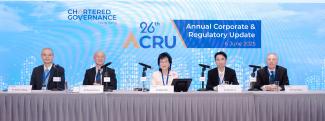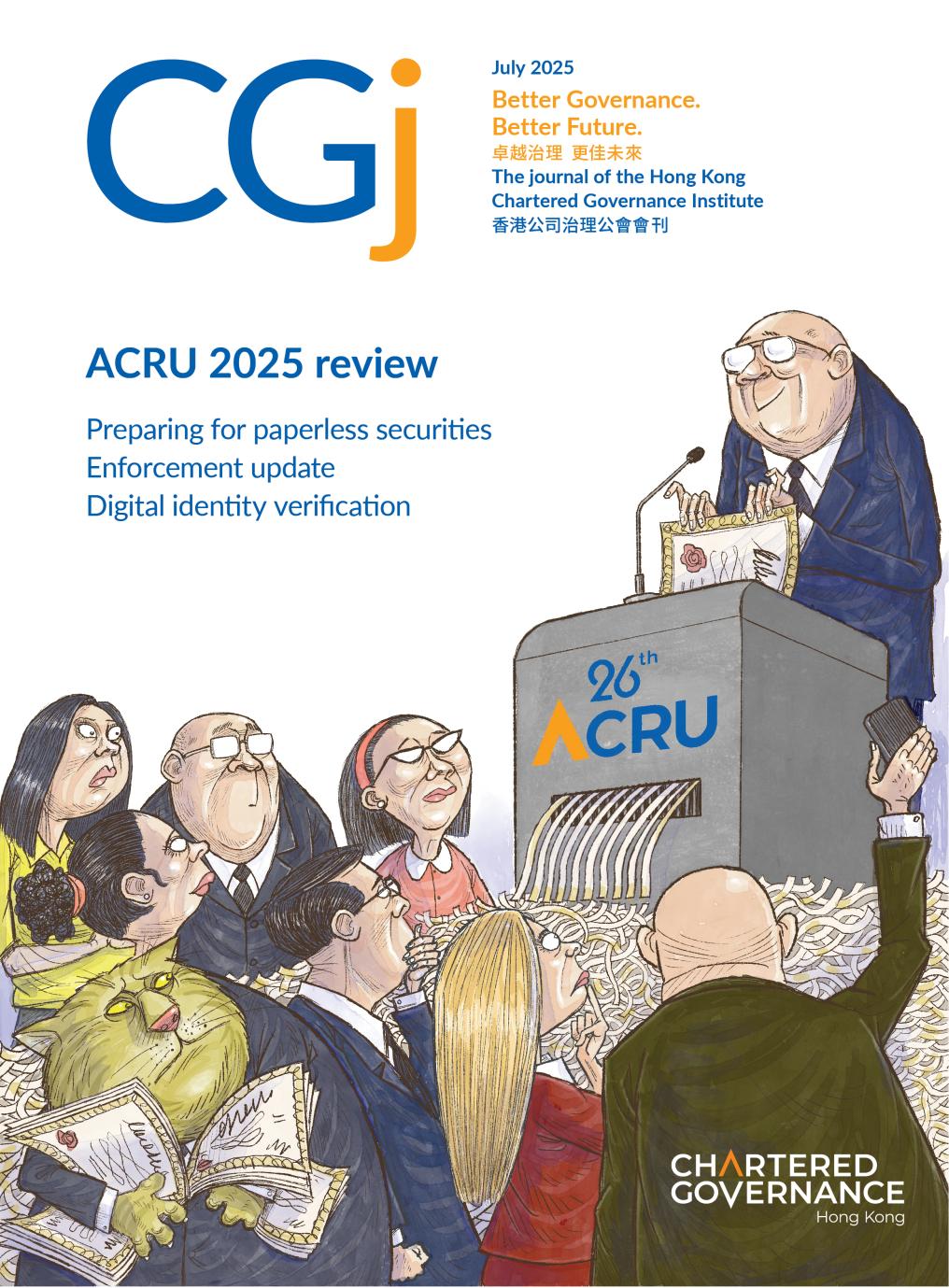
Strengthening market integrity through accountability and transparency
Part two of the CGj review of ACRU 2025 concentrates on the enforcement priorities, compliance updates and market development efforts that are shaping the future of governance and investor trust in Hong Kong’s financial markets.
Highlights
- SFC’s new Misconduct Mitigation Team uses AI-driven data analysis to detect red flags in corporate disclosures before misconduct escalates
- HKEX urges issuers to move beyond generic disclosures and to instead provide specific, well-explained insights into accounting judgements, business model changes and financial performance to enhance investor trust
- regulators underscore the critical role of directors and INEDs in preventing corporate misconduct
Enforcement priorities
Moving from reaction to prevention
In her presentation, Joanna Lee, Director, Enforcement, Securities and Futures Commission (SFC), pointed out that the SFC’s upcoming strategic priorities include mitigating serious market risks and improving corporate governance standards.
The SFC has established a dedicated Misconduct Mitigation Team. Ms Lee described the team as a strategic shift away from pure reactive enforcement. ‘We’re quietly reshaping our approach to include proactive risk detection and mitigation – our aim is not only to punish and deter, but also to prevent.’
At the core of the team’s work is a market-scanning model that uses artificial intelligence (AI) and pattern recognition to assess public disclosures and detect early signs of potential misconduct. ‘The system highlights companies that display red flags and patterns based on those of past misconduct cases,’ Ms Lee explained. ‘By applying data analytics and regulatory insight, we are getting better at identifying red flags before misconduct escalates.’
Examples of common red flags include substantial loans to obscure third parties, related-party transactions lacking commercial substance and impairments recorded shortly after large advances. ‘We’ve found that these indicators often precede major losses or are symptomatic of fraudulent activity,’ Ms Lee noted. ‘When detected early, they allow us to engage with boards and audit committees before matters become more serious.’
When a company is flagged, the SFC engages with the listed companies directly. ‘It’s an opportunity to course-correct, reinforce internal controls and protect shareholder interests.’ Ms Lee underscored that enforcement today is no longer just about consequences, it’s about creating conditions that enable improvement. ‘If we allow poor internal controls to fester until a scandal erupts, it is often the case that losses have already been incurred and investors have already suffered,’ she said.
In conclusion, Ms Lee outlined the three key outcomes the SFC hopes to achieve through this proactive enforcement model.
- Early intervention. Spotting internal control issues or governance gaps before they cause harm.
- Behavioural change. Encouraging directors and senior management to take ownership of internal control and risk management policies, and to improve governance culture.
- Market confidence. Reinforcing trust in Hong Kong’s capital markets by demonstrating a smarter, more responsive regulatory regime.
“We’re quietly reshaping our approach to include proactive risk detection and mitigation – our aim is not only to punish and deter, but also to prevent.”
Joanna Lee
Director, Enforcement, Securities and Futures Commission
Director accountability
A core message of this year’s ACRU was that directors are not bystanders, instead, they are the first line of defence in protecting shareholder value and upholding market integrity. In his presentation, Kenneth Luk, Senior Director, Enforcement, SFC, set out how regulators are using enforcement not just to punish wrongdoing, but to drive better governance behaviour, starting in the boardroom.
Mr Luk’s presentation focused on a recent enforcement action against Combest Holdings Ltd, a listed company that incurred over HK$293 million in losses due to overvalued acquisitions and other fraudulent activities. Combest, once engaged in healthcare and electronics manufacturing, was ultimately suspended and delisted, with court-ordered compensation paid to minority shareholders following regulatory proceedings. ‘The Combest case is a stark reminder that directors and people who occupy senior management positions are entrusted with protecting shareholders, as well as with ensuring that their companies operate with integrity and transparency,’ Mr Luk said.
Mr Luk highlighted five noteworthy lessons from the case.
- Act in the interest of shareholders. Directors must prioritise the company’s long-term value, not personal or third-party gains.
- Transparency and truth. Full, accurate disclosures are of paramount importance.
- Independent oversight. Boards must avoid being dominated by controlling individuals.
- Compliance with regulations. Boards should have regard to all applicable rules and regulations.
- Ethical leadership. Directors must set the tone for integrity across the organisation.
‘Ethical leadership is vital in promoting a culture of integrity and accountability within the company – the tone at the top sets the standard for the whole company,’ Mr Luk stressed.
“Ethical leadership is vital in promoting a culture of integrity and accountability within the company – the tone at the top sets the standard for the whole company.”
Kenneth Luk
Senior Director, Enforcement, Securities and Futures Commission
Echoing this message, Kenneth Chan, Senior Vice President, Listing Regulation and Enforcement, Listing, Hong Kong Exchanges and Clearing Limited (HKEX), offered insights from recent HKEX investigations and enforcement actions. He categorised common misconduct into four types, as follows:
- controlling shareholder bias
- dereliction of directors’ duties
- false or misleading disclosures, and
- breaches of transaction-related Listing Rules (Chapters 14 and 14A).
The focus is not just on what went wrong, but also on whether directors have discharged their duties and the responsibility expected of them, Mr Chan said. ‘It’s not only about the executives doing the wrong thing, it’s also about the non-executives doing nothing at the right time or not asking the right questions at the right time.’
Mr Chan placed particular emphasis on the role of independent nonexecutive directors (INEDs), noting an ‘expectation gap’ between how some INEDs perceive their role and what regulators require. ‘INEDs are the eyes and ears of the shareholders inside the boardroom,’ he said. ‘They’re not there to run the company, but they are there to ask the right questions, as well as the hard questions.’
Mr Chan noted that INEDs sometimes see themselves as passive overseers, but that mindset needs to change. ‘If you don’t get the information you need, ask for it. We expect directors to act independently, think critically and contribute constructively,’ he said.
“INEDs are the eyes and ears of the shareholders inside the boardroom.”
Kenneth Chan
Senior Vice President, Listing Regulation and Enforcement, Listing, Hong Kong Exchanges and Clearing Limited
Targeted tools to address corporate misconduct
Flora Ma, Director, Corporate Finance, SFC, detailed a suite of proposed enhancements to the Securities and Futures (Stock Market Listing) Rules (SMLR) designed to strengthen regulatory safeguards and provide more flexible tools to deal with corporate misconduct.
The proposed enhancements fall under four main categories – problematic IPOs, post-IPO conduct, the resumption of trading and review procedures. ‘Our goal is to promote transparency and accountability while minimising disruption to the market,’ she said.
For problematic IPOs, Ms Ma said the SFC is introducing a more nuanced approach. ‘We propose to impose tailored, disclosure-based conditions at the listing stage, especially where red flags suggest inflated valuations or questionable underwriting arrangements.’ Under the proposed rules, listing applicants may be required to confirm the absence of side arrangements with intermediaries, disclose material post-listing transactions between the issuer and intermediaries, and explain the use of listing proceeds in their first annual financial reporting.
The second consideration is post-listing conduct. The SFC currently relies on trading suspensions under Section 8(1) of the SMLR when serious concerns arise about a listed issuer’s disclosures or operations. The proposed amendments would give the SFC a less disruptive alternative. ‘We want to ensure that investors can make informed decisions through sufficient disclosures, without necessarily suspending trading,’ Ms Ma explained. For instance, if a listed issuer plans to acquire a target company on the basis of questionable valuation assumptions, the SFC could require an independent valuation and evidence of board-level due diligence, all subject to public disclosure.
The third enhancement of the SMLR involves improving the efficiency of resumption processes. Currently, resumption decisions often involve lengthy procedures. To address this, the SFC proposes a streamlined approach where its Board of Directors can delegate non-controversial cases to an executive director or committee with a view to minimising the duration of suspensions while maintaining oversight rigour.
The fourth SMLR reform area focuses on enhancing the current decision review mechanism. The proposal is to consolidate the different procedures involved in reviews of SFC decisions under the Securities and Futures Appeals Tribunal (SFAT), a body chaired by a judge. ‘Shifting reviews to the SFAT provides a more transparent, independent process and aligns with broader regulatory practices,’ Ms Ma said.
Compliance updates
The importance of internal control
Patrick Yu, Senior Vice President, Listing Regulation and Enforcement, Listing, HKEX, emphasised that the quality of Hong Kong’s capital market is a reflection of the quality of its listed companies and, for regulators, good corporate governance and transparency are two central pillars underlying issuer quality.
Mr Yu’s main theme was that underlying deficiencies in internal controls are the root cause of a number of different compliance failures. Results announcement delays, for example, are often the result of poor audit planning and a failure to provide timely information to the auditors. These issues are often tied to weak internal coordination and a lack of early engagement with audit professionals.
Internal control failures have also been observed in companies’ inability to assess and document the financial impact of changes in their operating environments. ‘The lack of a proper risk management system prevents companies from proactively adjusting internal policies and also makes them unprepared for audit enquiries,’ Mr Yu suggested.
To reduce the risk of compliance failures, Mr Yu urged issuers to allocate sufficient resources to compliance functions, seek professional advice when needed, and regularly monitor and review the effectiveness of internal controls. He closed by reiterating that corporate governance is a culture, not a compliance checklist. ‘It starts with the board setting the right tone. Once the mindset is in place, robust internal controls and disclosure will follow naturally,’ he said.
Transparency requires substance
Both Mr Yu and his colleague, William Wong, Head of Accounting Affairs, Listing, HKEX, urged issuers to go beyond generic or boilerplate disclosures in their corporate reporting. This was one of the primary themes, for example, of the HKEX Review of Issuers’ Annual Reports 2024.
The 2024 Review notes that some issuers continue to fall short in qualitative disclosures, especially in areas such as key judgements and estimates, impairment testing and fair value measurement. Too often, disclosures merely replicate accounting standard requirements without explaining how those standards apply to the issuer’s specific circumstances.
Some issuers also tend to rely on boilerplate language in the management discussion and analysis (MD&A) section of their annual reports. Mr Wong cited one example where a company disclosed a major change in its business model, without offering any rationale for the change or analysis of its potential financial impacts.
Mr Wong called for enhanced disclosure of relevant risk factors in the annual reports. This is particularly important where prior disclosures have flagged regulatory, operational or financial risks that later materialised. ‘Shareholders need to understand how risks evolve and what management is doing in response,’ he said.
For certain types of issuers, Mr Yu spotlighted specific areas for improvement in the MD&A section. ‘Issuers that are loss-making and/or that have material going-concern issues should disclose their directors’ strategy and plan to sustain operation and turnaround,’ he suggested. ‘Issuers whose shares are traded at a substantial discount to net book value and/or are thinly traded are encouraged to enhance their discussion on shareholders’ returns, covering areas such as dividend policy and capital efficiency analysis. Newly listed issuers are advised to make their MD&A disclosure on a par with the standard of listing documents,’ he added.
For non-GAAP (Generally Accepted Accounting Principles) financial measures, Mr Wong addressed the need to reconcile them with those of GAAP in financial disclosures. The 2024 Review found that, in several cases, non-GAAP measures were not properly defined, reconciliations with GAAP figures were missing and adjustments such as impairment of trade receivables were inappropriately included.
Mr Wong reminded the audience that the ultimate responsibility for financial statement integrity lies with the issuer and their board of directors, while the audit committee provides the supervisory function. ‘Directors should actively engage with auditors on audit-focused areas, and should ensure that accounting estimates and policies are robust and defensible,’ he said.
In conclusion, Mr Wong recommended that ACRU attendees familiarise themselves with the HKEX Guide on Preparation of Annual Report. The Guide is a useful one-stop shop to assist issuers in preparing their annual reports.
Sponsor obligations
IPO sponsors play a crucial gatekeeping role in safeguarding market integrity and investor confidence. Anthony Wong, Director, Intermediaries Supervision, Intermediaries, SFC, provided a clear overview of the duties and standards expected of IPO sponsors in Hong Kong. ‘Sponsors are expected to exercise professional scepticism and reasonable judgement, as well as to perform tailored due diligence to ensure listing applicants meet regulatory requirements,’ he said.
He added that the SFC’s ‘Circular to licensed corporations on expected standards for sponsor work’ is still as relevant today as it was when it was published in 2018. He highlighted the following five areas as being particularly relevant.
- Due diligence. Sponsors must customise their due diligence plans based on the issuer’s business model. For example, online platforms and manufacturers warrant different approaches. They must document significant discussions and decisions, and follow up rigorously on red flags.
- Delegation of work. While sponsors may delegate certain tasks, they retain ultimate responsibility. They must critically evaluate third-party reports, assumptions and methodologies.
- Interview practices. Interviews with key stakeholders must be properly planned and verified. Remote interviews, in particular, require identity verification, as well as documentation of selection criteria and interview coverage.
- Proper record-keeping. Sponsors must maintain comprehensive documentation to evidence the scope and depth of due diligence, decisions made and how issues were resolved.
- Resources and internal controls. Senior management must ensure systems and controls are in place to oversee sponsor work effectively, including escalation mechanisms and annual assessments.
‘Sponsors serve as the first line of defence in our market,’ Mr Wong said. ‘A robust IPO market depends on sponsors’ professionalism, vigilance and ethical judgement.’


